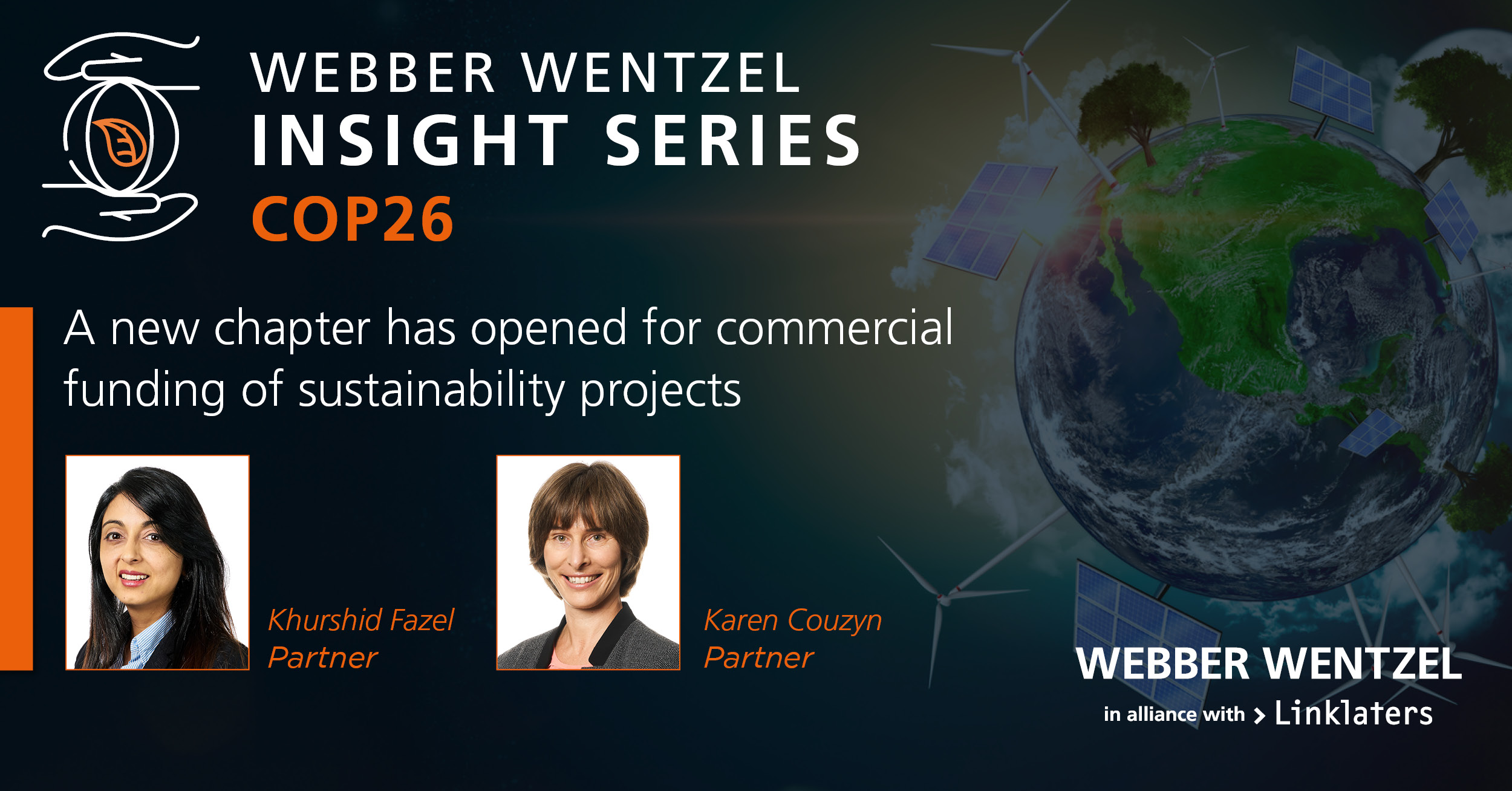Innovative funding for sustainability projects is spurring legal firms like Webber Wentzel to innovate also in the loan agreements that they are drafting for clients
One of the discussion points at COP26 is around sustainable finance and mobilising public and private finance flows at scale for mitigation and adaptation. A key question to ask is how is this funding issue playing out within the South African context and what are the issues that are cropping up in the space?
Demand for sustainability-linked loans is surging, with banks competing to offer this new form of finance in South Africa. Webber Wentzel, as one of very few legal firms operating in this area in South Africa, is being challenged to devise innovative ways to draft terms and agreements.
Sustainability-linked loans vs green bonds and other sustainable instruments
A sustainability-linked loan or a sustainability-linked debt security (collectively referred to as a "SLL") is different from a green bond or other sustainability use of proceeds debt security. A SLL could be used for any purpose, e.g. making an acquisition, but the interest rate applicable is informed by the achievement of certain targets by the borrower on environmental, social and governance key indicators.
Sustainability use of proceeds debt securities, on the other hand, are advanced to finance one or more green, sustainable and social projects. A green bond, for example, is specifically lent to fund a “green” activity, such as building a solar plant.
A green bond, like any other sustainability use of proceeds or sustainability-linked debt security, can now be listed on the sustainability segment of the JSE, and is thus available for investment by a wide group of financiers, including pension funds and asset managers.
There are usually four performance indicators in a sustainability-linked loan: three are related to the environment and one is related to social factors.
The environmental goals are generally quite standard: improving the lender’s carbon footprint, waste and water management. However, the social element is usually unique and is specifically tailored to the environment in which the borrower operates. For example, a sustainability-linked loan to a hospital might depend on achieving a specified level of patient satisfaction.
These will not all be absolute goals. They could also be incremental. For example, a borrower could state its current carbon footprint is X and it intends to improve this to Y during the term of the loan – or even beyond the maturity of the loan, in which case annual targets would be set during the term of the loan and their achievement would be independently verified. Whether the borrower achieves or misses its targets will influence the interest rate.
One of the reasons that banks are able to offer SLLs at favourable interest rates is related to their back-to-back funding. Entities such as the World Bank and International Finance Corporation (IFC) will provide funding to banks for onward lending at a concessional interest rate, on condition that those funds are only lent to achieve sustainability objectives. Using this form of finance improves the funding costs of commercial banks, and they can offer better rates to their customers.
Market demand for sustainability-linked loans
SLLs are becoming very popular in South Africa. Sustainability-linked bonds did not fulfil the requirement of market participants for a predictable interest rate, but on SLLs, the lender is able to take a more flexible long-term view. Over the past couple of months we have seen several sustainability-linked instruments, issued by, for example Redefine, Rand Water, Mediclinic and various other real estate and retail companies. We expect this trend will continue, following global trends. Fortress REIT Limited has issued an interesting instrument, which has features of both a green bond and a sustainability linked bond. This is the first listed corporate five-year sustainability-linked note in South Africa, and the first where there is both a margin step down and a margin step up. The company’s cost of funding will be determined by pre-agreed performance objectives linked to its renewable energy projects and additional solar PV installation targets.
TUHF Limited, advised by Webber Wentzel, launched the first social impact bonds in South Africa. The bonds were issued by Urban Ubomi 1 (RF) Limited, as asset-backed structure administered by TUHF and listed on the JSE Sustainability Segment.
Webber Wentzel’s banking and finance lawyers have advised on a number of sustainability loans and bonds. This is a challenging field, because there are no previous agreements to provide a template and we are having to solve various issues along the way, creating intellectual property in the process. To date, we have handled a couple of iterations of these loans, which has enabled us to anticipate problematic areas and make improvements.
An area where government could play a role in promoting sustainability-linked financing would be in providing more tax incentives. Currently, there are some tax incentives for companies to become more environmentally and socially responsible, but they generally achieve their objectives through penalties. Positive incentivisation is far more effective in encouraging correct behavior.
Webber Wentzel will be publishing various insights on the COP26 conference discussions. Stay tuned to this COP26 Insight Series for more.
